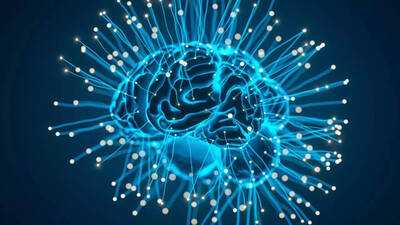It turns out that your gut might have a sense all its own. Researchers at Duke University have discovered that the colon is home to tiny, specialized cells called neuropods. These cells can sense what’s happening inside your body, almost like taste buds, but for your gut.
They pick up on things like sugars and signals from gut bacteria, then send fast messages straight to your brain. The idea is that your gut may have a “sixth sense” that helps shape your cravings, when you feel full, and even how your brain works.
Scientists are calling it the neurobiotic sense. And according to the researchers, this “hidden sense” could lead to new treatments for obesity and brain-related disorders tied to diet.
“It’s similar to how we use our other senses, sight, sound, smell, taste, and touch, to interpret our world,” the study authors said in a press release from Duke University.
“But this one operates from an unexpected place: The gut.”

For a long time, doctors and scientists have talked about the gut-brain connection. It’s known that the gut sends signals to the brain that affect mood, digestion, and how we feel overall. But the Duke study, published Wednesday in the journal Nature, reveals something more specific: how certain gut cells respond to bacterial activity and change behavior as a result.
What they found in mice
The researchers focused on a protein called flagellin. Some types of bacteria in your gut release this protein when you eat. Flagellin helps bacteria move around.
The special gut cells, neuropods, have a receptor called TLR5 that recognizes flagellin. When the cells spot it, they send a message to the brain through the vagus nerve. That’s the main communication line between the gut and the brain.
To understand how this works, the team studied mice.
In one experiment, they let a group of mice go without food overnight. Then they gave them a small amount of flagellin from Salmonella Typhimurium, a bacterium known to cause infections. Those mice ate less than usual.
Then they tried the same test on a group of mice that didn’t have the TLR5 receptor. This group kept eating. They didn’t get the message that they were full, and they gained more weight.
Everything else about the mice stayed the same. Their activity and habits didn’t change.

That led to an important conclusion: The TLR5 receptor tells the brain when it’s time to stop eating. Without it, that signal doesn’t arrive.
“If we disrupt this pathway, then the animals end up eating a little bit more for a little bit longer,” said Diego Bohórquez, a neuroscientist at Duke University’s School of Medicine, in an interview with The New York Post.
Bohórquez previously showed that these same neuropod cells can tell the difference between real sugar and fake sweeteners. They pass that information to the brain, which helps explain why we often prefer real sugar.
“Looking ahead, I think this work will be especially helpful for the broader scientific community to explain how our behavior is influenced by microbes,” said Bohórquez, who is also a professor of medicine and neurobiology and the senior author of the study.
They pick up on things like sugars and signals from gut bacteria, then send fast messages straight to your brain. The idea is that your gut may have a “sixth sense” that helps shape your cravings, when you feel full, and even how your brain works.
Scientists are calling it the neurobiotic sense. And according to the researchers, this “hidden sense” could lead to new treatments for obesity and brain-related disorders tied to diet.
“It’s similar to how we use our other senses, sight, sound, smell, taste, and touch, to interpret our world,” the study authors said in a press release from Duke University.
“But this one operates from an unexpected place: The gut.”
For a long time, doctors and scientists have talked about the gut-brain connection. It’s known that the gut sends signals to the brain that affect mood, digestion, and how we feel overall. But the Duke study, published Wednesday in the journal Nature, reveals something more specific: how certain gut cells respond to bacterial activity and change behavior as a result.
What they found in mice
The researchers focused on a protein called flagellin. Some types of bacteria in your gut release this protein when you eat. Flagellin helps bacteria move around.
The special gut cells, neuropods, have a receptor called TLR5 that recognizes flagellin. When the cells spot it, they send a message to the brain through the vagus nerve. That’s the main communication line between the gut and the brain.
To understand how this works, the team studied mice.
In one experiment, they let a group of mice go without food overnight. Then they gave them a small amount of flagellin from Salmonella Typhimurium, a bacterium known to cause infections. Those mice ate less than usual.
Then they tried the same test on a group of mice that didn’t have the TLR5 receptor. This group kept eating. They didn’t get the message that they were full, and they gained more weight.
Everything else about the mice stayed the same. Their activity and habits didn’t change.
That led to an important conclusion: The TLR5 receptor tells the brain when it’s time to stop eating. Without it, that signal doesn’t arrive.
“If we disrupt this pathway, then the animals end up eating a little bit more for a little bit longer,” said Diego Bohórquez, a neuroscientist at Duke University’s School of Medicine, in an interview with The New York Post.
Bohórquez previously showed that these same neuropod cells can tell the difference between real sugar and fake sweeteners. They pass that information to the brain, which helps explain why we often prefer real sugar.
“Looking ahead, I think this work will be especially helpful for the broader scientific community to explain how our behavior is influenced by microbes,” said Bohórquez, who is also a professor of medicine and neurobiology and the senior author of the study.
You may also like

Households urged to spray common kitchen ingredient into their fridges

Weight loss professor says three 'healthy' foods 'add up quickly'

DWP benefits and HMRC payments to be issued early next month

ENG vs IND 2025: 'Trying to find best way to fit Kuldeep Yadav into playing XI without compromising on batting front' - Morne Morkel

Mum found guilty of manslaughter after baby thrown from car because he wasn't strapped in






